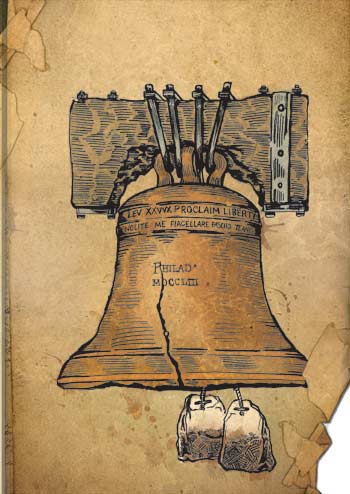Welcome to the Tea Party
No taxation without localized irritation
by Camilla Mortensen
 |
 |
| This rv showed up at the tea party rally in salem this week. photo by Deborah Bloom. |
 |
| Aaron Baker |
 |
| Jaynee Germond |
The Tea Party isn’t a party at all. It’s not a political party (except in Nevada), and sup-porters say it’s not the gathering of Mad Hatters that the left and the mainstream media have made it out to be.
So who are these people, and what do they want?
Tea Partiers are sensitive to what they call the mainstream media criticisms that have mocked them with tea bag jokes and for their faith-based politics and accused them of racism in their criticisms of Obama and in their fight against undocumented workers.
There is no one group in Lane County that holds Tea Party values; rather, there are several of them, from Lane and Cottage Grove 9.12ers to local members of Americans for Prosperity and FreedomWorks.
The Tea Partiers say that they are a bipartisan group with conservative and Libertarian ideals. They want to get back to basic values like God and the Constitution. They say they are Republicans and Democrats alike — though EW was not able to find any Democrats associated with the Tea Party for this story — and, in Lane County, they represent people who are unhappy with the direction this country is heading.
The Birth of a Movement
The story of the Tea Party reads like what religious scholars and rhetoricians call a jeremiad, a type of sermon that follows in the vein of the biblical Jeremiah. God charged Jeremiah with chiding Jerusalem and the kingdom of Judah for worshipping idols and other not-so-good things and telling them to get back to the way God was supposed to be worshipped. Jeremiah got beaten up, imprisoned and a host of other stuff for his trouble.
A rhetorical jeremiad follows a formula: First it reminds the audience of the courage and piety of the founders, then it laments recent and current problems, and finally it cries out for a return to original conduct and zeal. For Tea Partiers, this is the challenge: to remember the founding fathers, to speak out against what America has become and finally to get Americans to return to the founding ideals of the Constitution.
The Tea Party, despite that whole colonial Boston thing, really got its start in the land of coffee — the Pacific Northwest — and it darn near could have been called the Anti-Porkulus Party.
Conservative Seattle blogger Keli Carender, aka “Liberty Belle,” appears to have been the first to bring the Tea Partiers together when she put out the word about a protest on Feb. 16, 2009, in Seattle against the federal Stimulus Bill, or, as she called it, the Porkulus Bill. And yes, pork was served at the protest. Seattle’s porkulus protest kicked off other tax protests around the country, with roast pigs of their own.
But it was CNBC’s Rick Santelli, a cable-news reporter and former futures trader, whose rant later that month against the White House mortgage bailout plan gave the Tea Party its name. In a clip that quickly went viral on YouTube, Santelli railed, “The government is promoting bad behavior.”
Amid cheers from people behind him on the floor of the Chicago Mercantile Exchange, he said, “We’re thinking about having a Chicago Tea Party in July. All you capitalists that want to show up to Lake Michigan, I’m going to start organizing.”
Rather than tea, “We’re going to be dumping in some derivative securities,” Santelli said.
And so was born the Tea Party Patriots, an “official grassroots American movement.” Across the nation it spawned local groups seeking to unite those who share the core values of “fiscal responsibility, constitutionally limited government and free markets,” according to its website. The Tea Party already had protesters sporting tea bags by April 15, 2009.
And there is indeed that whole unfortunate “teabagging” issue.
Though Tea Partiers now distance themselves from the term, which has a certain sexual connotation, early protests did involve tea bags. A tax day protest last year in Washington, D.C., was brought to a halt when protesters threw teabags and boxes of teabags at the White House, leading to a potential bomb scare. The tea-protest types were also urged to mail tea bags to their federal representatives on websites like www.teabagparty.org (“tax protest for busy people”). The Oregonian’s Jeff Mapes, blogging on tax day 2009, speculated, “Are today’s tea bag protests a grassroots phenomenon or just a ratings tool for Fox News?”
The left seized with delight on the whole scrotum-in-the-mouth connotation, as at first did the mainstream media. CNN’s Anderson Cooper later apologized for responding to the observation that the minority party seems to have lost its voice with the comment, “It’s hard to talk when you’re teabagging.”
God and America
Aside from it being eternally linked in the public mind to an act often associated with sex and bondage, the Tea Party’s God issue also makes some critics nervous about the movement. Allied with the Tea Party is the 9.12 Project, which also arose in the spring of 2009. The brainchild of conservative radio host and Fox News pundit Glenn Beck, it sprinkles a little religion into the fiscal and constitutional mix.
Beck says that the nation needs to get back to where it was on the day after 9/11, when Time proclaimed that irony was dead, and it was a time “we were all just Americans, concerned about our country, concerned about each other,” says Cottage Grove 9.12 Project organizer Pam Duffy. “We’ve slowly gotten away from that,” she says.
“The idea behind the 9.12 Project is to get our country back,” she says, “back to the principles of our founding fathers.”
“The founding fathers, the majority of them, were very faith-based,” Duffy says, and she says in addition to political issues, “faith has brought a lot of people into it too.”
She adds, “It wasn’t that it was anything that was requirement per se, but just in general discussion it’s come out that a lot of people have a very strong faith.”
Duffy says the Cottage Grove chapter of the 9.12 project numbers 70 people who regularly attend its twice-a-month meetings, and 115 active members. Tea Parties meet potential political candidates and talk about local and national issues like the war, excessive taxes and potential limits on gun rights. “The government has been encroaching into areas where constitutionally they should not be,” she says.
A recent meeting in February attracted Commissioner Faye Stewart, Cottage Grove Mayor Gary Williams, and Springfield Mayor and congressional hopeful Sid Leiken to engage with the Tea Partiers, who Duffy says come from as far away as Roseburg and Eugene.
The 9.12 Project uses as its emblem Benjamin Franklin’s “Join or Die” snake, but rather than the eight sections of the colonial woodcut representing the eight colonies, the 9.12 snake is cut into 10 sections. Nine of the sections represent the project’s nine principles:
1. America Is Good.
2. I believe in God and He is the Center of my Life.
3. I must always try to be a more honest person than I was yesterday.
4. The family is sacred. My spouse and I are the ultimate authority, not the government.
5. If you break the law, you pay the penalty. Justice is blind, and no one is above it.
6. I have a right to life, liberty and pursuit of happiness, but there is no guarantee of equal results.
7. I work hard for what I have and I will share it with who I want to. Government cannot force me to be charitable.
8. It is not un-American for me to disagree with authority or to share my personal opinion.
9. The government works for me. I do not answer to them, they answer to me.
Conveniently enough, if you’re not into the God thing, the Lane 9.12 website says you need only accept seven of the nine principles. The rattles on the tail of the snake represent the 9.12 Project’s 12 values: honesty, reverence, hope, thrift, humility, charity, sincerity, moderation, hard work, courage, personal responsibility and gratitude.
Everyday values that everyday people can get behind: That, the Tea Partiers say, is what the movement is all about and what attracts followers.
The “how I came to the Tea Party” stories have a bit of a Christian conversion element. Person after person tells a tale that sounds a bit like the “I once was lost, but now I’m found” story, which starts off with the teller complacent and willing to put up with the evils of world, until something happens to jar her into action, which redeems her and brings her to God — or in this case, the Tea Party.
“None of us were really political before,” says Duffy, who says she was a 30-year federal employee before retiring to Cottage Grove in 2003.
Tea for Lane County
Lela Trope, the woman who created 9.12 Lane, says it’s not that she wasn’t interested in politics before, because she was. “I’m one of those geeks who reads the Voters’ Pamphlet from front to back.”
For Trope it was a series of events, she says: Barack Obama’s election, listening to Glenn Beck and last year’s county jail beds debate “that was the tipping point,” she says. Her passion for the issue, she says, has caused a rift between her and her daughter, who she says sold out for Obama, but Trope continues in her work fighting against issues like big government taxation, illegal immigration and welfare. “Why is it in Oregon,” she asks, “we have so many children that can’t speak English?”
After being laid off from her job last year, she says, she used to lie in bed in the mornings, listening to Beck. Every morning he would tell listeners to get online and find a meet-up group for other like-minded people, she says. And every morning she failed to find a group. So she created one. The first meeting of Lane 9.12, which took place at The Cooler Bar and Grill in Eugene on March 12, 2009, attracted more than 100 people, she says. “This thing started from an absolute void.”
Trope says, “We looked around at each other at The Cooler, and saw all these people who came out in Eugene, Oregon, to be with other conservative people.”
Kerry Ferguson, who has worked with the Republican Party in the past, is starting a local chapter of FreedomWorks, a group with an agenda closely allied to the Tea Party. FreedomWorks is “an organization that works for lower taxes, less government and more freedom,” she says.
The group plans to start “attending community meetings like the City Council and the county commissioners’ meetings and that sort of thing, and voicing our concerns about local issues,” she says.
She too cites Beck as a catalyst for the movement. “I really think Glenn Beck brought a lot of it into perspective and said ‘This is what you need to do.’”
“He’s done a tremendous job of researching different issues,” she says of the strident political commentator.
Paul Krugman in The New York Times called FreedomWorks a fake grassroots group. Rather than grassroots, he wrote, FreedomWorks events are “AstroTurf.”
Trope takes umbrage to such criticism against the Tea Party movement and its ilk. She says there are no deep pockets behind her group. “The first several hundred dollars of this,” she says, “I thought my husband was going to go through the roof, but came out of my pocket.” She adds, “I still haven’t been reimbursed, but that’s OK.”
“I’ve been doing this before they came along, and I’ll be doing this after.”
She defends the movement against mainstream media, which she says “has really gone so far off track because they have wanted to believe that somebody’s teaching us things; somebody’s putting bugs in our ears; somebody’s been giving us money; somebody’s been orchestrating this.”
“This is where the media irritates the beans out of all of us,” she says. “I never heard of teabagging in my life! I’m still not sure what it is.”
She says the mainstream media “has tried so hard to say, ‘These people. What is wrong with these people?’”
Trope says, “My own mother-in-law said ‘You’re just doing this because Barack Obama’s a black man.’”
Limiting Government
Aaron Baker posts his “No Sugar Coated News” on YouTube as ADB024. His videos also show up on Tea Party pages and on local TV station KVAL’s website in the “YouNews” section. In one video he calls the Hult Center the place where “the adult Communists hang out,” and in another he calls Kitty Piercy “Eugene’s commie mayor,” while a third explains how Communists use “people of different skin color, the Jews, the gays, the women, the downtrodden, the drunks, the drug addicts, the criminals — these are all useful utensils of the revolution,” he says.
In an interview, soft-spoken Baker seems a far cry from the firebrand on YouTube. “You’ve seen the videos,” he says with an almost self-deprecating chuckle. He explains that it was a trip to the former Soviet Union to see the homeland of his immigrant wife that opened his eyes. “What really motivated people is realizing that government’s getting out of control,” he says.
“I am a strong supporter of the U.S. Constitution,” Baker says. And “isolationist policies when it comes to war,” he adds.
“The common ground,” among Tea Partiers, he says, “is we don’t want the government involved in our lives completely.”
That common ground revealed itself Feb. 15, when a Presidents’ Day Tea Party rally in Salem drew a largely white and upper-middle-aged crowd that included a large coterie of motorcyclists concerned about helmet and concealed carry gun laws.
Baker, like many of Lane County’s Tea Partiers, was against the recently passed Measures 66 and 67. Many of the Tea Party and 9.12 gatherings focused on trying to get those measures that raised taxes on wealthy Oregonians and Oregon businesses stopped.
Baker says that in the upcoming Republican primary race for the chance to run against long-time Congressman Peter DeFazio, he’s looking at former Constitution Party, now Republican, Jaynee Germond of Roseburg. He says she has some good points on “limited government and all that.”
“Who I am going to go for would be a Ron Paul candidate,” he says. Congressman Ron Paul is a Libertarian-oriented Republican from Texas who has earned the support of many Tea Partiers.
The Tea Party Candidate?
Although it’s not a political party in Oregon, Tea Partiers are looking for candidates to support in upcoming primaries.
Locally, some politicians who have had their names linked with the Tea Party include West Lane Commissioner candidate Jay Bozievich, who organized the 2009 Lane County Tax Day Tea Party; Springfield Mayor Sid Leiken, who attended a Cottage Grove 9.12 gathering, and Congressional candidate hopeful Jaynee Germond, who recently raffled off a .45 caliber semi-automatic handgun for $5 a ticket to raise money for her campaign.
Germond evokes a Tea Party ideal with her can-do attitude and history as a widowed single mom who didn’t ask for help. She’s anti-big government, she says, and worries about the infringement of American rights through legislation like the PATRIOT Act. She’s for term limits and wants to curb immigration. “The problem is that the jobs they’re doing, they’re not all entry level jobs; they’re taking jobs,” she says of undocumented workers. “They’re not citizens; right now we’re struggling to take care of citizens.”
“I’m all for legal immigration,” she says, but “illegal means criminal.”
The handgun raffle sold about 2,000 tickets, she says.
“I’m a fiscal conservative,” she says. “My family calls me cheap.”
Conservatives don’t like asking for money, Germond says. “This is a way for me to be able do some fundraising, yet give the donors a way to get something back in return for that. And I just thought that it would be a fun way to do it. It’s a nice gun.”
Her campaign is all volunteer-run, she says, “I pay nobody, and the benefit there is that people are invested; this is something they believe in,” Germond explains.
In addition to taking a stand against control, she says she is pro-logging. “We need to get back into the woods,” she says. “The fact is we need the jobs; they’re worth more than the timber funds are.”
She says she’s been working on figuring out “how to get county control of timber lands back to us.”
“It’s a crop,” she says, though with a longer growing season, “and should be used as such.”
Overall, Germond says, when it comes to politics, “I just encourage everyone to be informed.”